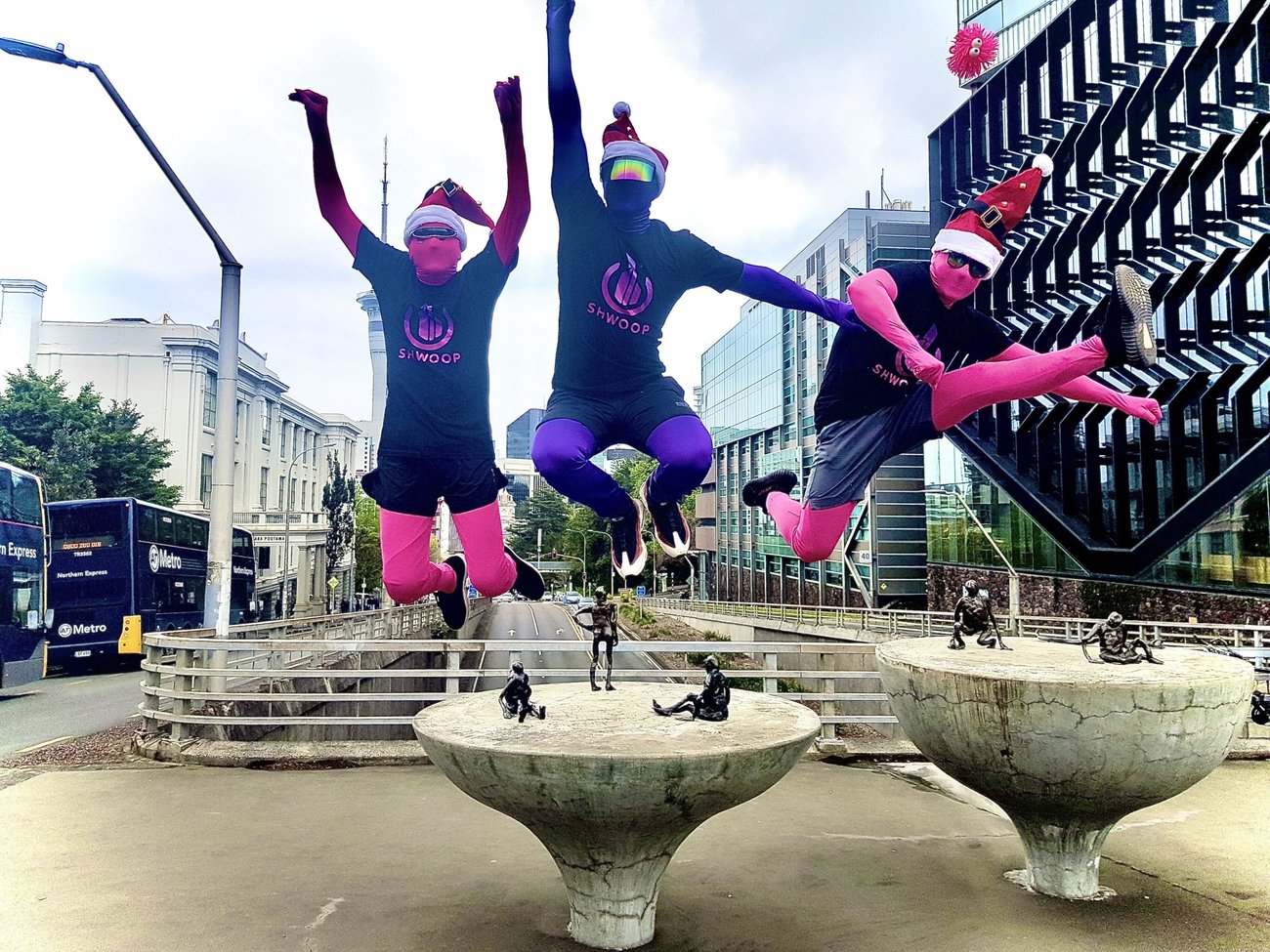
Hoffmann initially stepped into the technology arena at Unleash Space, Auckland University’s innovation centre, where he and a few university friends came up with a book recommendation system that recommended a book based on the user’s emotion. Then, it transitioned into food. Hoffmann set up a partnership with Foodstuffs to collaborate on a recipe recommendation system, which formulated personalised recipes to users based on their emotions.
Naturally, the ideas continued to spiral and he has now embarked on a broader mission, to turn cities into playgrounds.
The app, Shwoop, gives a set of challenges, similar to a treasure hunt, for people to complete across the city space. It’s currently working with AUT and Auckland University to run its first campaign across the university, where students are scampering feignedly around campus solving riddles and completing challenges.
 Hoffmann is joined by his team, fellow co-founder, Jamie McDonald, and developer, Tim Finucane. Also, Russell Bloxwich on software, Hayden Moore on hardware and Logan Fraser in the marketing department.
Hoffmann is joined by his team, fellow co-founder, Jamie McDonald, and developer, Tim Finucane. Also, Russell Bloxwich on software, Hayden Moore on hardware and Logan Fraser in the marketing department.
The app has multiple nodes around campus and with each node there is a different challenge. It runs two types of events, he says, one is a live event, such as a coffee tasting challenge, where 25 participants attempt to taste different varieties of coffee and guess what it is – with the winner receiving a lifetime supply of coffee. The other doesn’t involve humans, but is Bluetooth beacon-based, so people have to figure out a riddle and once it is solved the Bluetooth beacon recognises the user has completed the challenge.
It’s also managed to partner with some big brands such as Lime, Red Bull and Torpedo 7, and others – some examples of prizes include UE booms or Shaky Isles Coffee.

Hoffmann describes the app as, “a guerilla advertising platform that creates hi-tech physical activations for city gamification”. For the brand, it gives them a chance to be attached to something experiential, rather than plonking an ad on Facebook or Google.
He says, “We don’t want to sell people, in the same way Facebook ads sell people with ads, we want to sell people through a fun experience. So, we sideline the brand and they fund the campaign. People complete a riddle to win the Lime Voucher”.
“That’s why we call it scalable guerilla marketing, so we can have multiple brands on board with different experiences, and for the brands they can opt in and out of different experiences based on what works for the brand.”
People love the app, too. In one week-and-a-half, it has received over 3,000 downloads. It also has over 2,000 students signed up and over 650 actively playing. Plus, it is trending fifth on Social Media iOS NZ, outpacing big tech platforms like LinkedIn.

Of course, there will be many who question the social value of people following their phone around the city, along with some justified safety concerns.
Pokémon Go caused a deluge of weird consequences. Unclear if it was the fault of the game itself, or the people who play it, but reports covered drivers crashing cars while playing the game on their phones and people being rescued by emergency services after chasing a Pokémon and getting stuck up a tree. But, Hoffmann assures, he has given safety a lot of thought.
“We have a lot of volunteers around campus. We have a lot of people running around in morph suits – if you tag the morph suit you have a free coffee. We have been very about the messaging in the app, such as we warn people not to use Shwoop near roads.”
He adds, it’s also very different to Pokémon Go. He says, “People read the riddle, figure it out, then explore the place where they think the answer is. You only use your phone for guidance, instead of it being an artificial reality game”.
Furthermore, despite some of the extreme cases, Pokémon Go was equally lauded for improving the social health of cities, getting kids outside and improving foot traffic, something urban designers have longed to achieve. Hoffmann hopes Shwoop can also achieve strong social benefits.
“We consider ourselves as a social start-up, we love the idea of launching people into this spontaneous challenge. We call it the commute changer, where people can be walking down the street and your commute changes because all of a sudden there is a new challenge, then you are able to stumble upon new people also doing that challenge.
“We are wanting to add a bit of spice to Auckland City, we have been in touch with Panuku Development Auckland, who are keen to turn the city into a place for us to interact with and activate. We are a platform that is able to bring a bit of life to a city space, whether it be at a university campus at the viaduct or at a festival.”




